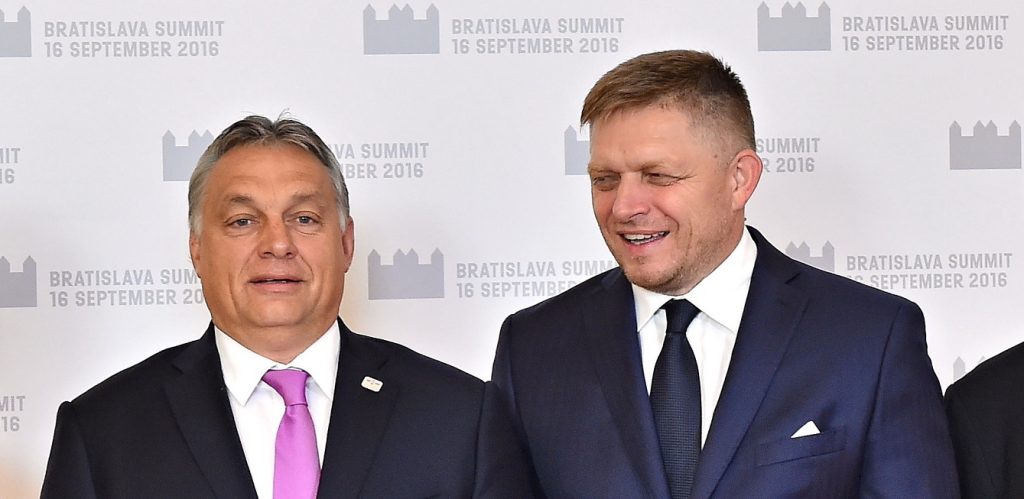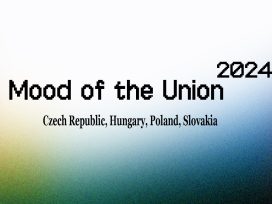The EU’s illiberal contagion
Europe is facing not only Orbán’s autocratic turn but also that of his ‘apprentice’: Slovakia’s prime minister, Fico, has taken an advanced course in attacking his country’s judiciary, media and cultural institutions. His first goal: to get away with it, say beleaguered intellectuals, theatre directors, political scientists and investigative journalists from Bratislava.
Often, the trigger for an illiberal slide is not so much lust for power as the realization that it is slipping away. Leaders cross the line: it is no longer enough for them to govern a country; a bid to autocratically remodel the media, the judiciary, culture and the economy, as well as politics, takes over.
This is what happened with Viktor Orbán. In 2010 he returned to government in Hungary after a string of electoral defeats and set about reshaping the country in his own image. Now it appears the same is happening with Robert Fico in next-door Slovakia. The former ‘ambitious young communist’ is now 60 but he has lost none of his drive.
Power at any cost
‘A few years ago, Fico confided that he kept a suitcase packed at home’, says Péter Hunčík, an advisor to Czechia’s former prime minister Václav Havel. ‘Corruption investigations had reached people close to him’ and ‘he was in a state of anxiety, convinced that sooner or later the police would kick him out of bed and throw him in jail.’ Hunčík, an intellectual who inspired the foundation of the liberal party Most-Híd (Bridge), has intimate knowledge of Slovakia’s power dynamics. He remembers well when Fico saw his premiership slip away. It was 2018 when he had to step down, following the murder of journalist Ján Kuciak and the ensuing protests.

Viktor Orbán and Robert Fico, Bratislava Summit 2016. Image by Photo Rastislav Polak via Wikimedia Commons
Losing power is the trigger. What follows is the obsession to get it back and not let it slip away again. For years Orbán plotted his own return to power, preparing to place an entire country under his control. ‘Fico’, says Hunčík, ‘relied on Orbán to learn how to build an autocratic system, and in just a few months was already making a copy of the Hungarian model’. Hunčík knows what he is talking about: as a member of Slovakia’s Hungarian minority, he knew the ‘young liberal’ Orbán and was even his friend; today that past seems remote.
Orbán’s slide towards authoritarianism has been ongoing for years with notably little pushback from Brussels. Now, the illiberal contagion is spreading: not just from Hungary to Slovakia but also to Italy, which isn’t immune under Giorgia Meloni’s far-right government.
Last spring’s assassination attempt on Fico exacerbated efforts to ostracize and suppress dissidence. In September, a parliamentary majority, backing Fico, deposed the deputy speaker of the National Council, Michal Šimečka, who, as head of the liberal Progressive Slovakia party, is Slovakia’s main opposition leader. The public broadcaster had already been captured and cultural institutions soon followed; protesters rallied again this autumn all across Slovakia.
But to understand the current acceleration, one has to start with the attacks on the courts. As political scientist Jozef Bátora explains, ‘the current illiberal tendencies stem from the attempt of Fico and his government colleagues simply to get away with it, not to end up under investigation or in jail. The rest follows.’ This may not be Fico’s first term, but it is unprecedented for its degree of illiberalism.
Lukáš Diko, head of the Ján Kuciak Investigation Centre, named after the journalist who investigated links between the prime minister’s circle and organized crime, recounts: ‘In 2018, after Kuciak was killed, a tide of Slovaks poured onto the streets. The anti-corruption movement forced Fico to resign.’ Centre-right member of parliament ‘Igor Matovič’, he explains, ‘was rewarded in the elections two years later because he had an anti-corruption agenda, allowing investigation into the crimes of Fico’s circle to continue.’
So how is it possible that the same Slovakia that revolted over Kuciak re-elected Fico, who is now attacking journalists? ‘In 2021 a recording was revealed in which Fico said, “I always keep ten per cent of my energy in reserve for revenge”’, recounts Diko. ‘And there you have it: he used his skill to make a comeback. While Matovič’s governance proved ineffective, Fico was shrewd in riding the anti-system wave of protests against pandemic restrictions. During his electoral campaign, he not only opposed aid to Kiev but above all else exploited social-media channels of disinformation as a form of propaganda with Moscow’s support.”
On taking power again in October 2023, ‘he immediately prepared a reform of the penal code, which was huge in scope’, says Diko. ‘The reform makes it possible to dodge penalties for financial crimes and shortens prison sentences for various offences. Most importantly, it may change the outcomes of several court cases involving the prime minister’s circle.’
Dealing with obstacles from Brussels
Lukáš Diko has a rule: as a journalist, he sticks to the facts. He observes that ‘the changes introduced help oligarchs and politicians close to the premier. Many of them are being tried for the very crimes that the reform targets’.
In July the fear that Brussels might block EU funds to Slovakia prompted the government to partially amend the reform. The subject remains a sticking point, but the European Commission seems willing to compromise. Indeed, something similar happened with the Hungarian prime minister: on the eve of the December 2023 European Council, Ursula von der Leyen released €10 billion to Orbán. This aroused the ire of the European Parliament, which promptly sued the Commission. The Hungarian autocrat’s recent trip to the Kremlin, which took place during Hungary’s six-month EU presidency, offered yet more proof that doing deals with the illiberals does not deter them at all.
Now the Hungarian script is being repeated in Slovakia. Earlier this autumn, the idea of freezing EU funds to Slovakia appeared to be on the table. Questioned on the subject in September, a spokesperson from the EU Commission said: ‘Over the past months, the Commission has made its concerns about the changes to the Criminal Code, including the dissolution of the Special Prosecutor’s Office, very clear to the Slovak authorities’. The Commission was ‘in the process of analysing the potential implication of July amendments’ to ‘finalize its assessment.’ And then what happened? The Commission authorized the disbursement of almost €800 million to Slovakia the following month. Naturally, Brussels promised to remain in contact with the Slovak authorities to follow up on outstanding issues. But in reality, the Commission has swallowed a bitter pill. ‘The amendments to the criminal code made by the Slovak parliament have partly alleviated our concerns’, it stated on 23 October.
Barely a week later, Fico was on a plane to Beijing. The Slovakian premier is also following in Orbán’s footsteps regarding relations with China. Hungary has taken loans from Beijing and acted as Xi Jinping’s EU outpost. In his turn, the Slovakian premier was in China from 30 October to 5 November to tighten political and economic ties. Political scientist Jozef Bátora explains: ‘First and foremost, Fico is trying to attract Chinese money. He had been planning this trip for some time for this very reason. Once he has secured resources from Beijing, he will feel less dependent on European funds, which in theory bind him to respecting the rule of law. And at that point he might become even more radicalized.’
Together with Slovakia’s president, Peter Pellegrini, who is his coalition partner, Fico co-signed a ‘memorandum on the orientation of Slovakian foreign policy’. This, explains Bátora, ‘talks of an open policy in all directions, including autocracies: Russia, China and so on’. This is something very much like Orbán’s ‘economic neutrality’; the two premiers are now speaking the same language. Before, a PIS-led Poland and Orbán backed each other in the European Council, both attacking the rule of law; with Poland now led by Tusk, this role falls to Fico. The Hungarian and Slovakian prime ministers have one another’s backs on geopolitical issues. Concessions by Brussels have generally been fruitless, as shown by the case of Hungary.
Culture under pressure
Meanwhile, radicalization proceeds apace inside Slovakia. ‘They ask me if I am thinking of leaving the country, but I love Bratislava, my life, my friends. So why should I give up?’, asks writer Michal Hvorecký. Indeed, as a regular target of attacks from ministers in the Fico government, he has decided to fight back. Months ago, he started a petition which has attracted hundreds of thousands of signatures. He has motivated several strikes in the cultural sector and was in the front row at this autumn’s protests, including that on 19 September.
‘In less than a year of this government, we have seen a frontal attack on the rule of law’, says Hvorecký surrounded by books in his living room in Bratislava. ‘Fico’s priority is to ensure impunity for himself and his sponsors. But he is also responsible for very grave acts of interference in the field of culture.’
First, he oversaw the closure of the public TV station RTVS and its replacement by the pro-government STVR, whose management was picked by the governing majority. Next, he set about normalizing the practice of attacking journalists.
Beata Balogová, the editor-in-chief of Sme, Slovakia’s leading daily newspaper, knows this well. After months of relentless attacks, even from the prime minister in person, ‘the day comes when you crack – I’ve had to take medicine for the anxiety’, she says in her office on Lazaretská Street in Bratislava. ‘Fico has always been an enemy of the press because it is journalists who bring to light the connections between his party and oligarchs. But attacks on the media and journalists have never been as intense and personal as they are today.’
By Balogová’s account, there is a real pattern, an illiberal playbook, which is being replicated: ‘Fico started with public TV. They all do that.’ This ‘all’ refers first and foremost to the prototype Orbán, who has even sent his advisors to help Fico, a nominal socialist. It also covers Meloni, whose capture of Italy’s public TV is now so thorough that Rai is being ironically dubbed ‘Tele-Meloni’.
Attacks on media freedom and efforts to silence dissidence go hand in hand with interference in the sphere of culture. It is all part of the illiberal template. Slovakia’s culture minister, Martina Šimkovičová, who is from the far-right party (SNS) in Fico’s coalition, recently conducted a mass dismissal of theatre and museum directors. They were replaced with faces familiar to Fico.
The ‘Ministry of Destruction’ is what Matej Drlička – a world-renowned musician and cultural manager – calls the government department. ‘The paradox? This summer, while I was receiving honorary titles in France, in Slovakia I was being dropped as director of the National Theatre. Under my management, the theatre was enjoying a resurgence. This government is destroying a sector that was getting back on its feet. The minister has also changed the way funds are accessed: the process is now subject to political discretion.’
After the ousting of Drlička and other cultural figures, petitions were signed and protests launched. Along with others, Drlička and Hvorecký have founded the Open Culture movement to try to halt Slovakia’s slide into authoritarianism.
(This article is an expanded and updated version of ‘The EU and the illiberal contagion: How Fico is bending Slovakia to his will’ published in Italian in Domani on 13 September 2024).
Published 18 November 2024
Original in Italian
Translated by
Voxeurop
First published by Domani (Italian version, 13 September 2024), Eurozine (English version)
Contributed by Institute for Human Sciences © Francesca De Benedetti / Domani / Institute for Human Sciences / Eurozine
PDF/PRINTIn collaboration with
Newsletter
Subscribe to know what’s worth thinking about.
Related Articles

Pronatalism has become a populist vote winner for right-wing parties in Central and East European countries. Demographic imbalances, involving youth migration, ageing populations and immigration resistance, have sparked a series of baby-making policies. But are financial incentives in Hungary, Poland and Serbia enough to reverse the trend of decreasing birth rates?

The Courts have acquiesced, the populace is compliant and the Democratic Party is splintered. Without any way to make their opposition felt, Trump’s opponents’ only hope is that the economy will cause MAGA voters to rethink.





